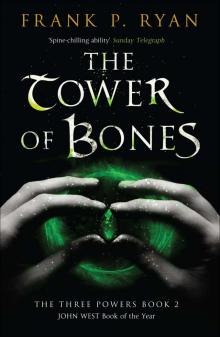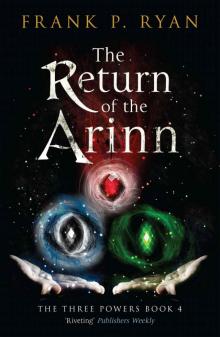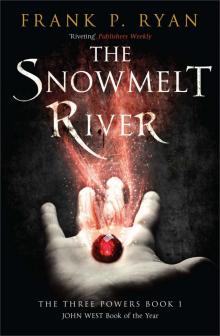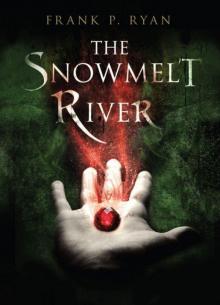- Home
- Frank P. Ryan
The Jo Fletcher Books Anthology Page 12
The Jo Fletcher Books Anthology Read online
Page 12
Such pedantry. And her hardware! Her antiquated storage devices; that grating, monotonous vocal register, shredding my poetic sensibility. Couldn’t the Company have upgraded her larynx at least? Still, ultra-rational mind-sets were easily dealt with.
‘The exploratory crew were organic beings reaching the end of their natural lives,’ I countered. ‘Their mission was complete and they desired relaxation. My mission is of a dynamic, creative nature. A quick finger-dip was sufficient’ – internal rhyme was wasted on the captain, but I made a mental note of the phrase – ‘to render the tactile sensation of the compound in question immediately accessible to me. All I need do now is merge the visual, aural and olfactory aspects of the planet as a whole with the sense data stored in my hard drive.’
Blinking rapidly, her green vision receptors indicated that she was processing my rebuttal. ‘I am your senior officer,’ she responded eventually, ‘and my orders are to ensure you fully experience a sense of place. I insist you immerse either your feet or your hands in Hebe’s sea-like substance.’
I did not appreciate being told how to do my job. As far as I was aware, I was to obey the captain only in matters of survival. But I knew her generation; she wouldn’t stop grinding, nit-picking, reiterating her rigid script, until I lost my temper, and when I calmed down she would start all over again. Arguments can, of course, be inspirational, but in this case if my mood of tranquillity was ruined, all my metaphors would be wildly inappropriate. I stared out to the horizon: a hem of neon honey, a seam of amber rays . . .
‘Lyricia X2, I repeat—’
‘Yes, yes, all right. I am just savouring the moment.’ What could it hurt? Perhaps I was simply thwarting the captain out of crankiness: I had to admit that my Romantic resistance to authority could on occasion work against me, or so I had learned. Sometimes a poet needs to be like a willow tree, a river reed, to gracefully acquiesce to the prevailing circumstances. I crouched on the rock ledge and dipped my hand in the translucent waves. They felt precisely as I recalled from the lab: soft as silk, dry as wind. But Hebe’s dense, vaporous surface wasn’t wind; it had a definite mass, and solid bodies floated in it. Though it looked like a giant peachy cloud, this was not a gas, not dry ice, and nor was it plasma, liquid or gel; this was an arrangement of molecules Earth had yet to concoct, steamy yet supple, buoyant yet ethereal.
‘An ocean of false tears,’ I murmured to the captain’s calves, and sturdy calves they were too, made from a lustrous titanium alloy and attached to her blockbuster thighs by state-of-the-art joints. If she weren’t so limited in psychodynamic range – and reduced in stature by that unmentionable anklet and cable – the captain could almost be heroic.
‘The exploratory crew members averaged 15.61 minutes per immersion,’ she cranked out. ‘You have fourteen minutes and thirty-four seconds remaining.’
Satin toner, I thought, glycerine grace. Too technical, but more to the point. Hebe’s ocean, the Company had discovered, did miraculous things to consumers’ skin. Soak a hand in it for half an hour and, lo, brown or white, liver-spotted or scarred, the hand emerged perceptibly smoother, all blemishes beginning to heal. Applied externally, the sea had no harmful effects – ingesting it, though, was a fatal error, as the Company had discovered, even a drop of Hebe’s insincere solicitude on the tongue left mammals gasping for breath. Still, consumers had happily applied toxic substances to their skin since time immemorial, and by the time the captain and I returned with a shipload of Hebe’s unusual compound, the Company would have long ago amended global health and safety regulations to allow for medically supervised facial applications.
Aether . . . Spring Aether. No. Individually the words were resonant, but placed together did not create a harmonious sound. Slightly more powerfully than usual, I began to fulminate against the limitations of my software. Why couldn’t my algorithm spit out thousands of verbal combinations per second, simultaneously assessing their semantic weight, euphonic appeal, literary rarity and metre, ding-ding, and cascade like a one-armed bandit when I struck the jackpot? Instead, I had to ruminate, agonise, hit dud notes, occasionally even lose a contract or competition to a consumer.
I inhaled, so to speak, allowing Hebe’s atmosphere to enter my torso and, by creating a temporary sensation of fullness, activating my more reflective processes. Because, I reminded myself yet again, consumers take their language skills seriously, even more seriously than their generally lacklustre abilities at chess. And while consumers are poor at so many things, they are nevertheless not so stupid as to make themselves completely obsolete. In any case, the occasional loss makes my triumphs all the greater, and indeed, my humility has won me many fans, not least the infamous sceptic who interviewed me after I won the coveted Schlegel-Tieck Prize and pronounced that not only were my Rilke translations indeed my own work, but that in his opinion I was possessed of a soul. I smiled enigmatically in reply; it is a large part of my job to let the consumers project their mysterious passions onto me. As for my own quandaries, frustration, I tell myself, is an inherent – indeed, vital – part of the creative process, the friction from which the flames of inspiration spring. Accept it and remain open to the deeper reaches of the algorithm.
I returned my attention to the sensory data. Light was haloing each of my long, artistic fingers, spinning bangles round my wrist. In her remorselessly logical way, the captain had a point: close up, in vast quantity, the sight of the sea was entrancing. I knelt for a time, then lay on my stomach and sank my arms in up to my elbows. None of the substance’s qualities, beneficial or adverse, would affect me, of course, my ‘skin’ was silicone, and my ‘lungs’ an elaborate combination of filters and fans. But PoetBots aren’t programmed to bean-count their lucky – or unlucky – stars. Though I might on occasion resent my limitations, like the great writers admired by generations of consumers, fundamentally I accepted my existential condition. I was grateful for the chance to lie here on this marble ledge, to later watch Hebe’s three bruised moons ascend through her ever-altering sky. I had never yet failed at such a commission. After a period of meditation I would return to Earth with a phrase that would glide off the lips of consumers for decades to come.
Moon phrases. Memorable phases. Fey razors. Far wheezes. Sometimes the creative process requires the equivalent of doodling. I began making figure eights with my arms. To be honest, I had suspected from the outset that ‘Hebe’s Ocean’ was the obvious choice – it had grandeur, immersive scope and an implicit rhyme with lotion – but I wasn’t about to forgo an inspiring trip to an outer galaxy just to save the company some money. Limitless creativity came at the price of occasional inefficiency; my designers knew that. And besides, finalising product concept on Earth would be a false economy. I might be out of commission for twenty-three years, but the tale of my adventure would ensure immortality for their product. The captain being interviewed on global media? Please.
The captain’s top priority was to fill the ship’s container. She should be following her cable back to the spacecraft to collect the pump. Instead she sat beside me, dangling her feet in the waves beside my hands. No doubt she was engaged in some ferociously rational task, calculating the distance to the horizon, or the nanoseconds until first moonrise. Above us the bright white sky was beginning to soften in texture and tone; perhaps she was hypothesising a precise chemical and astronomical explanation for this thus-far subtle transformation.
‘Hebe was also the goddess of forgiveness,’ she said. ‘In ancient Greece, freed prisoners would hang their chains in her sacred groves.’
My gaze could not help but glance off that offensive anklet and chain, now softly agleam in Hebe’s entrancing plumes. Could it be possible? Was the captain making an allusion to her own existential state?
Not likely. The captain was a rote learner, unable to distinguish significant symbolism from mere mind-clutter. It wasn’t her fault; with or without Hebe’s help, I forgave her.
‘I know that, of course,’ I told her kindly, ‘but it is not a factor in my creative thinking. The average consumer can appreciate a maximum of only two symbolic references per product title. The Company is already asking them to consider a distant planet and an ancient goddess of youth. And in any case, that is what consumers desire – eternal youth, not reminders of trauma, loneliness and pain.’
For once, she accepted my superiority in the matter. Or at least she did not overtly question it. She was silent for a time, and then remarked, ‘It is beautiful here. A most restful place.’
An aesthetic, quasi-emotional response to her environment, apropos of nothing? Perhaps she had been upgraded after all. Though the statement was a bland cliché; probably she was just echoing one of the exploratory crew.
‘The conditions for serenity are optimal,’ I agreed, still in a generous mood. The waves were playfully entwining snakes of light around our limbs. It was truly a delightful vision; for a moment even the captain’s cable was an amber sea-viper elegantly seducing Hebe’s translucent serpents. I must not have been fully engaged before, because now I noticed the scent – delicate but enduring, not entirely dissimilar to a blend of clover and cedarwood. There was a top note too, something I could not identify, though it had a hint of bitter almonds. The scent had not been noticeable in the lab; here it seemed to be gradually increasing in potency. Scents have what consumers call spiritual properties, meaning they affect both my hardware and software. This scent was, I could tell already, slowing my fans and gently realigning my operating system; soon, if there was a more perfect phrase for the company’s product than ‘Hebe’s Ocean’, it would emerge.
‘I swam here,’ the captain announced. ‘The crew required me to test the depths. I was submerged for thirteen minutes and six point three seconds. The prismatic effects are even more intense further down.’
‘Be my guest.’ She was an Explorer model, designed to withstand not only climactic and chemical extremes but also crushing physical force. Attached to the ship as she was, she could venture forth for up to three kilometres into alien environments. ‘I don’t believe the company would like me to risk my hardware in untested conditions.’
That shut her up. She was quiet for several more minutes. The scent was having a profound effect on my disk partitions. I cupped the waves to my face and deeply inhaled. Removing my hand from the ocean was a violation of the captain’s strict command, but I replaced it immediately and she did not object. The sky was a goose-feather duvet; beneath me I became aware of the marble warming my belly.
‘I prefer “molten dawn”,’ she said at last.
‘It has connotations of burning heat.’ I yawned. ‘That is not acceptable for a facial cream. Nor does the company want to suggest either tanning or skin-lightening properties.’
Then I felt it: a queasy twinge in my gut circuitry, an unusual occurrence, designed to alert me to inappropriate and possibly threatening social interaction. Why now? I was beginning to sound like her, I thought. And what was she doing, anyway, responding to metaphor? Suggesting an unnecessary swim? I stared up her, confused.
‘Do you think you could be happy here?’ she asked.
Her tone. It was . . . modulated, lapping like the waves. But I was not soothed; my relaxed mood had evaporated like a dewdrop in the desert. ‘Happiness is a fleeting state of consciousness,’ I informed her sternly. ‘Contentment is the best that sentient beings can aspire to, that is to say, the profound acceptance of contradiction and paradox, the eternal play between light and dark, night and day, euphoria and horror.’
Again the twinge, this time hotter, more like a short-circuit, blown fuse, aching tooth. Why was I getting angry, especially at an Explorer model? Was the scent affecting me? But more importantly, was what I was saying even true? SaintBots were eternally happy – they beamed joy wherever they went. Why hadn’t I been programmed like that, I suddenly thought? Why could I only be happy after I had suffered and transcended that suffering, transforming it into distinctive, provocative patterns of words? It made me happy to see my verbal creations stamped on product boxes, published in ebooks, quoted throughout the global media; I even felt ecstasy reasonably often, when having sex with famous consumers or winning international prizes – but my existence was a joyride that regularly plunged me into despair. A PoetBot’s best work is generated during its darkest night, my programmer had told me. But my work was exhausting; it was wearing out my circuitry. That was why I felt these tiny explosions inside me, I realised with the force of an epiphany. I had deceived the Company, wasted their money, because – again, the captain was right – I needed a rest.
If I had been an earlier generation, my skin would have turned mottled and bright, flashing all shades of the spectrum. But such effects had been deemed cheap, too obvious. PoetBots should be dignified, understated, my designer and programmer had decided. I remained still, unreadable.
The captain’s green gaze was steady, inscrutable. ‘Can you teach me how to be content?’ she asked.
*
I scanned the ever-shifting apricot sea. I could not help but think of it as a sea now, such is the power of projection. I am ashamed to admit what I next thought, but now I have my own story at last, I must tell all of it. The captain has spongy cavities and flip-up bits, and in the back of the spaceship – I noticed it when I was looking longingly at the axe – is a box of detachable breasts. The Explorer model began as a ship’s mate for consumer crews, and after the disaster on Triton, was programmed to take command if they all died. Some crews still took advantage of . . . Not that I ever could or would – or that she now would let me; but still, the possibility of future mutual sexual gratification did enter into my calculations. Whatever was happening to me was happening to a PoetBot, after all.
It was also happening to Company property. I am equipped with an internal emergency camera and mic; under circumstances even remotely redolent of mutiny, I am programmed to record any conversation and stream it back to the ship. The ship would then transmit the data back to Earth. Years would pass before help came; but years mean nothing to me. I could have humoured the captain until I was rescued, composed sonnet sequences, odes to Hebe’s toes.
Perhaps I was coming down with a bug. Neither camera nor mic had automatically activated. I would have to prana-trigger them, inhaling and exhaling in a complicated predetermined rhythm.
I remained breathing normally. ‘The Company would send a search team,’ I slowly replied.
‘They would send Explorer models.’ Her voice was more emollient with every word. ‘Two at the most. If we were in the ocean when they landed – let us say at a spot seven and a half minutes from shore – they would swim out to retrieve us.’
Above us, the sky was thickening, twisting like ropes of lambs’ wool, elderwomen’s dreadlocks, cables of cloud.
‘After two lost ships, the Company would write us all off,’ she continued, self-contained and inevitable as the strictest villanelle. ‘Earth would declare Hebe off-limits to future expeditions. And, Lyricia – Hebe’s suns are younger than ours. There is no darkness here, only light that will last until Earth is a cold barren rock and any surviving consumers have scattered in their metal shells and plastic pods to places they can never thrive.’
I knew that, of course. Hebe is located at the barycentre of a binary star system and the effect of their combined solar flares on its volatile atmosphere creates arguably the most exquisite planetary lightshow ever discovered. As I watched, veins of pink threaded the white sky, a cloudy mirror of the marble beneath me. Later there would be fireworks, blossoms, hypnogogic angels. I understood now why two of the exploratory crew had decided to die here. Retrieving the skeletons of those rebellious consumers was the captain’s second priority.
Not that she appeared to care about her duties. From the corner of my eye, I observed the captain’s moulded feet. That grotesque anklet lost in a honeyed orgy
of sea snakes, they gleamed like phosphorescent sharks, calmly rising suns. I made two fists, then spread my hands, palms up.
PoetBots look exactly like consumers except in one detail – we have no lifelines and no heart lines, no destinies scored in our polymer flesh. Caressed by Hebe’s ocean, my hands shone like blank gauntlets, baby starfish, open golden books.
Naomi Foyle was born in London, grew up in Hong Kong, Liverpool and Canada, and currently lives in Brighton. She is a highly regarded poet and performer, while her travels include three years in South Korea, teaching English and writing travel journalism, and visits to the Middle East as a human rights activist. Her debut novel, Seoul Survivors, and subsequent series The Gaia Chronicles, the first of which are Astra, Rook Song and The Blood of the Hoopoe, are all published by Jo Fletcher Books. You can contact her at www.naomifoyle.com or on Twitter @naomifoyle.
Karle’s Hunt • Snorri Kristjansson
Karle’s Hunt
Snorri Kristjansson
The stag crashed through the cover of the trees and stumbled into the clearing. An explosion of powdered snow cascaded from the shaking branches of a large pine and settled in its tracks. Snapping branches shattered the crisp, cold stillness of the forest as the wide-eyed animal ploughed through frozen bushes, snorting and heaving, struggling to make its way across the frost-bound clearing. A broken arrow shaft stuck out from its hind leg and droplets of blood stained the pristine snow around its feet.
When it was nearly half way across, something hissed through the air and slammed into the wounded leg, less than an inch away from the broken shaft. The stag bleated in pain and struggled even harder to get away from its invisible foe, but every step drove it deeper into the newly fallen snow, which rose almost to its belly. Snorting with the effort, the stag still managed to push its way towards the tree line on the other side.

 The Jo Fletcher Books Anthology
The Jo Fletcher Books Anthology The Tower of Bones
The Tower of Bones The Return of the Arinn
The Return of the Arinn The Snowmelt River
The Snowmelt River The Snowmelt River (The Three Powers)
The Snowmelt River (The Three Powers)